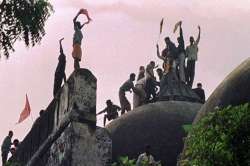Babri Masjid-Ram Temple title case: New SC bench to hear pleas from Oct 29
Earlier, the case was being heard by a Bench of then Chief Justice Dipak Misra, Justice Ashok Bhushan and Justice S Abdul Nazeer.

The new Supreme Court bench will hear the pleas in the Ayodhya Ram Janmabhoomi Temple case from October 29. The new bench will comprise of Chief Justice of India Ranjan Gogoi and two other judges, justices SK Kaul and Justice KM Joseph.
Earlier, the case was being heard by a Bench of then Chief Justice Dipak Misra, Justice Ashok Bhushan and Justice S Abdul Nazeer. After the retirement of CJI Misra on October 2, the Bench has been reconstituted.
Procedural formalities, including filing of affidavits, counter-affidavits, rejoinders and translation of documents running into thousands of pages are already over and the case has now been listed for issuance of directions.
The top court had on September 27 refused to refer to a larger Bench its 1994 verdict which ruled a “mosque is not an essential part of the practice of Islam”. It had directed the cross appeals in the Ayodhya title suit to be listed before a three-judge Bench on October 29.
By a 2:1 verdict, a Bench headed by then CJI Misra had said the court’s observation in the 1994 case was made in the limited context of “land acquisition” at the disputed site and it was not relevant for deciding the main title suit, in which cross-appeals against Allahabad High Court’s September 30, 2010 verdict are pending before the top court for eight years.
However, Justice S Abdul Nazeer had dissented, saying “all mosques, all churches and temples are significant for the community.” The “questionable” observation of 1994 verdict had permeated into the Allahabad High Court’s decision in the case, he had noted.
If mosque was essential part of the religion cannot be decided without a “detailed examination of the beliefs, tenets and practice of the faith”, Justice Nazeer had said, ordering the issue to be referred to a larger Bench. He even referred to the court’s recent decision to refer the issue of female genital mutilation to a larger Bench.
Muslim parties to the Ayodhya title suit wanted the top court to reconsider the five-judge Constitution Bench in 1994 in M Ismail Faruqui case which said a mosque was not integral to Islam and Muslims could offer prayer anywhere. They apprehended that the 1994 ruling would adversely affect the outcome of the title dispute.
Hindus believe that Lord Ram was born in Ayodhya thousands of years ago. During Mughal emperor Babar’s rule, a mosque was constructed at the place in 1528 after destroying the temples existing there.
More than 70 years after the Faizabad Civil Court rejected its claim over Babri Masjid as a Shia Wakf, the Shia Central Waqf Board of UP had last year moved the Supreme Court to assert its claim over the disputed site. Interestingly, the Special Leave Petition – which challenged a 1946 decision of the Faizabad Civil Court – said the Babri Masjid was built by demolishing a Ram Mandir in Ayodhya.
The RSS, Vishwa Hindu Parishad and BJP have been running a campaign for the construction of a Ram temple in Ayodhya. On December 6, 1992, kar sevaks of right-wing Hindu organisations demolished the disputed structure. Many BJP leaders, including LK Advani and Murali Manohar Joshi, are facing a criminal case in connection with the demolition.
But the civil dispute over 2.7 acres is a separate one that has been on since 1961 when the Sunni Wakf Board took the matter to court.